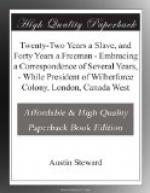“Very true,” said the other, “but it is dark and long past midnight, and beside they have been indulging their appetites, and we cannot tell what they may attempt to do.”
“Pshaw!” he answered, contemptuously, “they are unarmed, and I should not fear in the least, to go in among them alone, armed only with my cowhide!”
“As you please, then,” he said, rather dubiously, “but look well to your weapons; are they in order?”
“In prime order, Sir.” And putting spurs to their horses, were soon at the house, where they dismounted and requested one of the party to remain with the horses.
“What,” said he, “are you so chicken-hearted as to suppose those d——d cowardly niggers are going to get up an insurrection?”
“Oh no,” he replied, carelessly, but would not consent to have the horses left alone. “Besides,” said he, “they may forget themselves at this late hour; but if they do, a few lashes of the cowhide will quicken their memory, I reckon.”
The slaves were aware of their movements, and prepared to receive them.
They stepped up to the door boldly, and demanded admittance, but all was silent; they tried to open it, but it was fastened. Those inside, ranged on each side of the door, and stood perfectly still.
The patrol finding the slaves not disposed to obey, burst off the slight fastening that secured the door, and the chief of the patrol bounded into their midst, followed by several of his companions, all in total darkness!
Vain is the attempt to describe the tumultuous scene which followed. Hand to hand they fought and struggled with each other, amid the terrific explosion of firearms,—oaths and curses, mingled with the prayers of the wounded, and the groans of the dying! Two of the patrol were killed on the spot, and lay drenched in the warm blood that so lately flowed through their veins. Another with his arm broken and otherwise wounded, lay groaning and helpless, beside the fallen slaves, who had sold their lives so dearly. Another of his fellows was found at a short distance, mortally wounded and about to bid adieu to life. In the yard lay the keeper of the horses, a stiffened corpse. Six of the slaves were killed and two wounded.
It would be impossible to convey to the minds of northern people, the alarm and perfect consternation that the above circumstance occasioned in that community. The knowledge of its occurrence was carried from one plantation to another, as on the wings of the wind; exaggerated accounts were given, and prophecies of the probable result made, until the excitement became truly fearful. Every cheek was blanched and every frame trembled when listening to the tale, that “insurrection among the slaves had commenced on the plantation of Col. Alexander; that three or four of the patrol had been killed, &c.” The day after, people flocked from every quarter, armed to the teeth, swearing vengeance on the defenceless slaves. Nothing can teach plainer than this, the constant and tormenting fear in which the slaveholder lives, and yet he repents not of his deeds.




